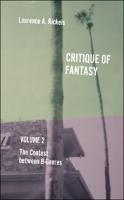Critique of Fantasy, Vol. 2
The Contest between B-Genres
Author(s)
Rickels, Laurence A.
Collection
ScholarLedLanguage
EnglishAbstract
"In The Contest between B-Genres, the “Space Trilogy” by J.R.R. Tolkien’s friend and colleague C.S. Lewis and the roster of American science fictions that Gotthard Günther selected and glossed for the German readership in 1952 demarcate the ring in which the contestants face off. In carrying out in fiction the joust that Tolkien proclaimed in his manifesto essay “On Fairy-Stories,” Lewis challenged the visions of travel through time and space that were the mainstays of modern science fiction. In the facing corner, Günther recognized in American science fiction the first stirrings of a new mythic storytelling that would supplant the staple of an expiring metaphysics, the fairy-story basic to Tolkien and Lewis’s fantasy genre.
The B-genres science fiction and fantasy were contemporaries of cinema’s emergence out of the scientific and experimental study and recording of motion made visible. In an early work like H.G. Wells’s The Time Machine, which Tolkien credited as work of fantasy, the transport through time – the ununderstood crux of this literary experiment – is conveyed through a cinematic–fantastic component in the narrative, reflecting optical innovations and forecasting the movies to come. Although the historical onset of the rivalry between the B-genres is packed with literary examples, adaptation (acknowledged or not) followed out the rebound of wish fantasy between literary descriptions of the ununderstood and their cinematic counterparts, visual and special effects.
The arrival of the digital relation out of the crucible of the unknown and the special effect seemed at last to award the fantasy genre the trophy in its contest with science fiction. And yet, although science fiction indeed failed to predict the digital future, fantasy did not so much succeed as draw benefit from the mere resemblance of fantasying to the new relation. While it follows that digitization is the fantasy that is true (and not, as Tolkien had hoped, the Christian Gospel), the newly renewed B-genre without borders found support in another revaluation that was underway in the other B-genre. Once its future orientation was “history,” science fiction began indwelling the ruins of its faulty forecasts. By its new allegorical momentum, science fiction supplied captions of legibility and history to the reconfigured borderlands it cohabited with fantasy. The second volume also attends, then, to the hybrids that owed their formation to these changes, both anticipated and realized. Extending through the topography of the borderlands, works by J.G. Ballard, Ursula Le Guin, and John Boorman, among others, occupy and cathect a context of speculative fiction that suspended and blended the strict contest requirements constitutive of the separate B-genres"
Keywords
psychoanalysis; cultural studies; film studies; science-fiction; fantasy; Gotthart Günther; J.R.R. TolkienDOI
10.21983/P3.0278.1.00ISBN
9781953035189, 9781953035196Publisher
punctum booksPublisher website
https://punctumbooks.com/Publication date and place
Brooklyn, NY, 2020Imprint
Brainstorm BooksClassification
Film history, theory or criticism
Psychoanalytical and Freudian psychology
Literary studies: fiction, novelists and prose writers


 Download
Download